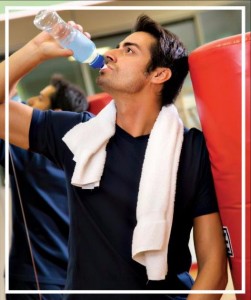Beat the Heat: How to Stay Hydrated
 This blog was written by Brandon Johnson, CSCS, FMS, USAW
This blog was written by Brandon Johnson, CSCS, FMS, USAW
“How much water should you drink” is a loaded question. There are a lot of factors that play a role in how water you should consume. The old saying is “eight servings of eight ounces of water a day,” but that does not take into account a lot of outside factors, no pun intended. Humidity, temperature, elevation, how much you sweat, and activity intensity and duration should all be taken into account when trying to prevent dehydration. A 2% loss of body weight has been shown to significantly affect your performance.
How should I measure or tell that I am hydrated? There are two simple methods to gauge your hydration level. First, and probably the easiest, is your urine color. The darker in color the more dehydrated you are; we are trying to stay lighter in color. The second; weigh in before your run and after your run and measure the amount of body weight you have lost. Keep in mind any clothing that you may have worn that has absorbed a lot of your sweat or extra water that you may have poured on yourself to cool off. It is best to weigh in, in a minimal amount of clothing to prevent confusion.
Now that I am aware of my hydration, how do I hydrate? If you know the time of your exercise, plan ahead. A couple of hours before you begin to exercise; drink 2-3 cups (eight ounces) of water, this allows for absorption into the body. Have another 1 to 1.5 cups 10 to 20 minutes before. During exercise, have another 1 to 1.5 cups every 10 to 20 minutes, up to five cups per hour during heavy activity. Post activity you would want to drink 2-3 cups of “fluid” per pound of body weight lost. “Fluid,” does not mean anything; certain products (i.e. sports drinks) may be advisable to have depending on the considerations outlined earlier.
A couple of last minute reminders: You can drink too much water. It can cause a sodium imbalance, possibly resulting in a serious condition, Exercise-Associated Hyponatremia. This can be exacerbated by the loss of electrolytes during exercise and a large consumption of water. Plan ahead on extremely hot and humid days and try to get exercise done in the cooler parts of the day. Older athletes, generally over 50, have a harder time staying hydrated. A number of theories are proposed to as why, but it is a serious consideration when performing exercise.
